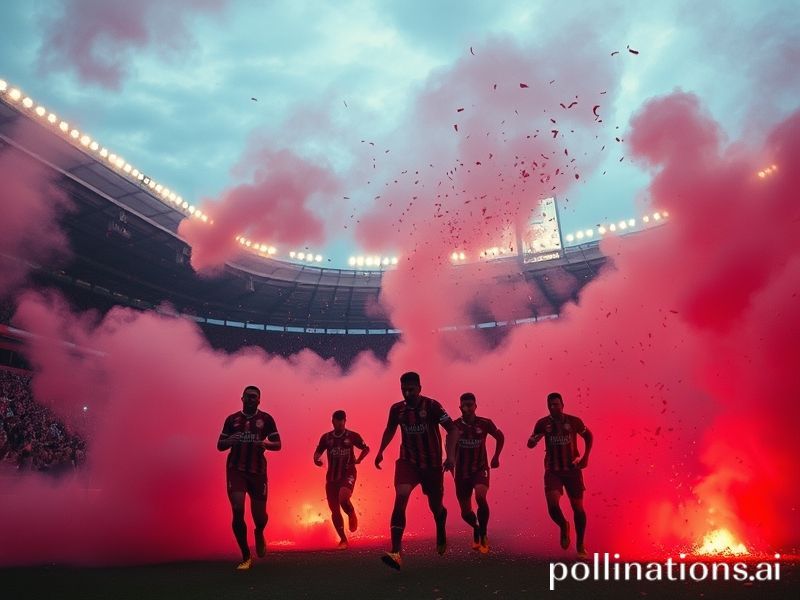Hearts FC: The Scottish Club Exporting Beautiful Failure to a Global Audience
Hearts FC: A Tiny Scottish Club Teaching the World How to Fail Upward
By Rodrigo “Rod” Valderrama, International Correspondent, still jet-lagged in Edinburgh
Edinburgh—The official line is that Heart of Midlothian Football Club merely plays in the Scottish Premiership, population: roughly the same as a midsize IKEA on a Saturday. Yet Hearts FC has quietly become a geopolitical Rorschach test for anyone who still believes sport and politics don’t share the same Uber.
Consider the evidence. On the surface, it’s a provincial outfit whose maroon shirts look suspiciously like dried blood after laundering—fitting, since the club’s finances have hemorrhaged for decades. But zoom out and Hearts is a case study in how to weaponize nostalgia, monetize misery, and export existential dread to a global audience. If that sounds grandiose, remember that last year a Singaporean sovereign-wealth fund, a Qatari sports-tech incubator, and two American “fan-engagement platforms” all toured Tynecastle Park like pilgrims sniffing relics. Their shared epiphany: Hearts loses money with such dependable flair that it has become a hedge against success elsewhere. In the age of sportswashing, failure is the new clean energy.
The club’s recent history reads like a satire drafted by a committee of nihilists. Administration in 2013? Check. Relegation the following year? Naturally. Promotion back to the top flight, promptly followed by a pandemic that turned stadiums into ghost cathedrals? Of course. Most teams would consider that a cautionary tale. Hearts turned it into a global masterclass in how to monetize schadenfreude. Their online membership scheme—“Foundation of Hearts,” a name that sounds like a rehab cult—now counts subscribers from 42 countries who pay monthly to watch a live feed of someone else’s slow-motion car crash. The Germans call it Fremdschämen; Hearts calls it recurring revenue.
Let’s talk geopolitics, because someone has to. When the club unveiled plans for a new £50 million stand, the Scottish government coughed up £12 million in “levelling-up” funds—coincidentally the same week Westminster slashed international aid and Edinburgh’s homeless shelters turned away frostbitten pensioners. The message to the developing world was clear: if you want foreign investment, try relegation followed by a compelling redemption arc. NGOs, take notes.
Meanwhile, Hearts Women’s team—recently promoted to Scotland’s top flight—has become an unlikely soft-power conduit. The squad features a Canadian Olympian, a Nigerian striker on refugee status, and a Scottish midfielder moonlighting as a TikTok philosopher. They lose less often than the men, which paradoxically makes them less marketable; victory lacks the tragic allure that sells scarves in Tokyo airport kiosks. Still, their Instagram Live sessions are syndicated in South Korea, where viewers use them to learn English swearwords and proper corner-kick technique.
The broader significance? Hearts FC is the canary in the coal mine for late-capitalist sport: a place where fans willingly purchase annual subscriptions to disappointment, where municipal budgets underwrite private nostalgia, and where the global south watches the global north ritualize economic self-harm with bagpipe soundtracks. FIFA may fret about Super Leagues, but Hearts has already built the Emotional Poverty League, and every continent wants a franchise.
As I left Tynecastle, a steward handed me a leaflet: “Own a piece of the pitch—literally.” For £30 you can buy a square inch of turf, complete with coordinates and a certificate. Mine now sits in my Madrid apartment, browning nicely under LED grow lights. It’s the perfect souvenir: a dying fragment of Scotland I can Instagram while Rome burns.
So when you next read about sovereign funds circling European clubs like vultures wearing Patagonia vests, remember Hearts FC. They didn’t just open the door to the absurd; they installed a revolving one and charged admission. In a world tilting toward autocracy, climate catastrophe, and streaming-service password crackdowns, it’s almost comforting to know that somewhere in Edinburgh, 20 men in maroon will lose on Saturday, and we’ll all feel slightly more alive for it.
Conclusion: Hearts FC reminds the planet that decline, properly packaged, is exportable. The club’s greatest victory isn’t the four Scottish Cups gathering dust; it’s convincing the rest of us that watching entropy can be a growth industry. In that sense, we’re all season-ticket holders now. Welcome to the game—hope you enjoy the free fall.







